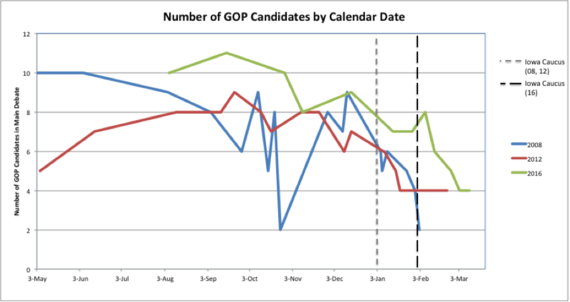The final GOP debate was scheduled for March 21st in Salt Lake City, the first sans-Rubio showdown after a big March 15 primary battle. But when Donald Trump decided he wanted to sit it out Wednesday, Ohio Governor John Kasich dropped out as well, prompting debate host Fox News to cancel it entirely. Unless the GOP decides to book another debate, the March 21st debate that never was will be a disappointing punctuation to a debate series characterized by indiscriminate shouting and sexual innuendo.
There's no doubt that the 2016 election has shredded the rules of American politics. But an overlooked narrative lies in the debates themselves - the GOP's slight changes in the scheduling of the 2016 debates show a shifting tide in candidate participation.
En route to John McCain's race to the 2008 nomination, the GOP hosted 20 official debates from May to the beginning of February. The 2012 election cycle maintained that stride, hosting 19 debates also from May to February before Mitt Romney grabbed the nomination.
For 2016, the GOP scheduled just 12 debates stretching from August to March (the thirteenth debate in Salt Lake City was added in February).
Although the GOP didn't explicitly explain why they changed the schedule so much for 2016, the decision may have been nudged by two factors: the relative ineffectiveness of debates taking place before August and the importance of debates running through the first few primaries.
The below chart combines 2016 GOP debate observations with 2008 and 2012 data from the University of Virginia's Center for Politics, plotting participation in all the GOP debates (largely ignoring forums, town halls and undercard debates) against the calendar day in which those debates took place.
Focusing on the left part of the chart, there's a noticeable invariability in the number of debate participants from May through September. In the 2008 race, there were at least eight candidates participating in every debate through September, which begs the question: when the same eight people are debating in five consecutive debates over the course of three months, when does public discourse devolve from informing to redundant?
In 2012, Republicans hoping to better pace their stride announced their candidacies later in the process (Jon Huntsman, Michele Bachmann and Newt Gingrich). This caused the hump seen from May to August, meaning the field of candidates didn't reach its full form until September. In other words, it wasn't until the sixth debate that voters were able to watch all the candidates they'd actually see on the ballot. By starting the debates in August, the 2016 GOP race was able to do away with many of these early debates.
The chart also illustrates how much farther into spring the 2016 debates stretched than the 2008 and 2012 debates. Part of this extension may have had to do with the Iowa caucus being pushed back a full month to February 1st (in both 2008 and 2012, the Iowa caucuses fell on January 3rd). So although one might look at the chart and think that 2016 candidates lasted longer than 2008 and 2012 candidates did, the exodus of presidential hopefuls does indeed occur at the same time when controlling for the Iowa caucus.
But the 2016 election bucks the trend when considering the number of caucuses that occur during the debate schedule. In the 2008 cycle, the final GOP debate (in which eventual nominee John McCain didn't participate) happened on February 2nd, at which point only eight states had conducted their caucuses or primaries. The 2012 debate cycle also missed Super Tuesday, and the February 22nd finale in Mesa, Arizona took place after only seven states had voted.
By pushing into late March, the debate schedule for 2016 charges right through Super Tuesday. Scheduling debates through March 10th meant that there would be televised events covering caucuses or primaries in 23 states and Puerto Rico.
There's good reason to keep the debates going through the primaries. Candidates could adjust platforms and rhetoric as the field of competitors thins out, which generally occurs in step with the first few weeks of primaries. For voters in states that don't have early primaries, a late debate could be the difference in who gets their name bubbled in on Election Day.
Which brings us to Donald Trump. Unlike the surge in debate viewership, Donald Trump had nothing to do with the debate scheduling decisions - a case could be made for why Trump benefited the most from the GOP's changes.
Extending the debate schedule through Super Tuesday opens the door for candidates to take advantage of momentum. Because the 2008 and 2012 debates only led up to Super Tuesday and not through it, the party's debates were limiting candidates to a kind of showcase-like pitch. Introduce yourself to America, make your best case on the debate stage and hope they vote for you.
With the 2016 debates rolling through primaries in almost a majority of the country, candidates could now use actual primary results from previous elections to rally support. This also works the other way - in the case of Marco Rubio, poor primary after poor primary left him statistically vulnerable in debates and the establishment candidate ended up collapsing completely.
It'd be irresponsible to draw causation between Rubio's exit and the GOP debate calendar, but in a way it would be poetic if the establishment's buckling were caused somewhat by the party's dramatic schedule change. In that case, it truly wouldn't have been the GOP failing to plan - it would have been the GOP planning to fail.
Brian Cheung is a freelance writer interested in socioeconomics, finance, and media analysis. He graduated from Syracuse University majoring in finance and broadcast and digital journalism. Brian's work can be seen at brian-cheung.com.
